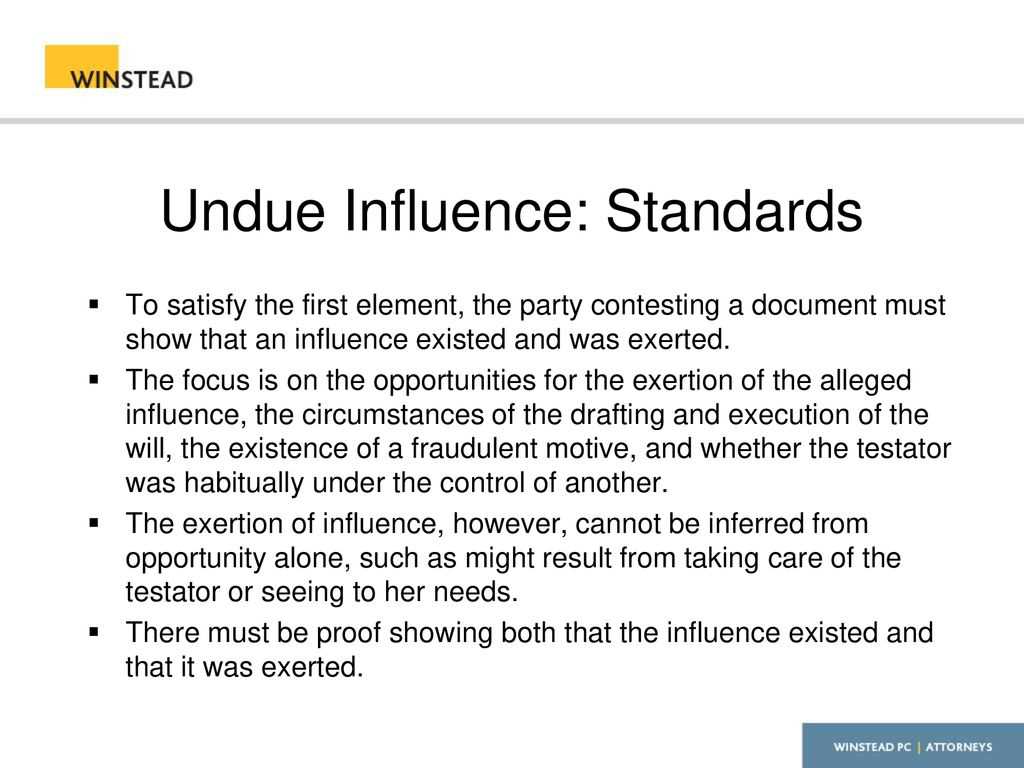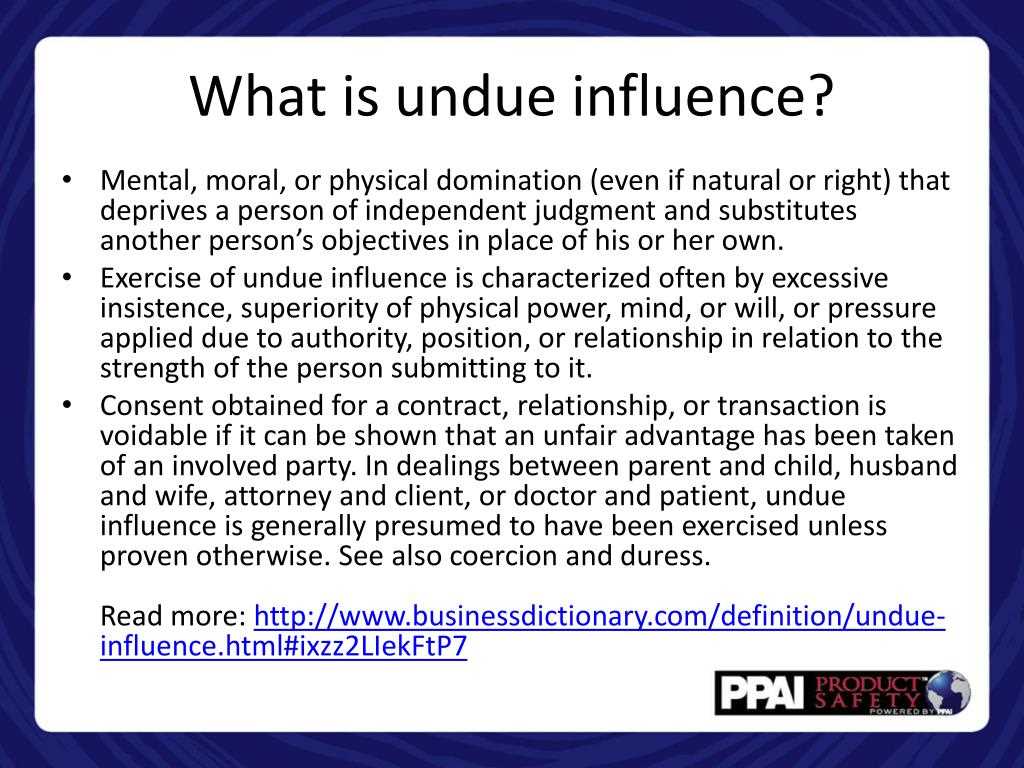Definition of Undue Influence

Undue influence refers to a situation where one person exerts an excessive amount of control or influence over another person, causing them to act against their own best interests. It is a form of manipulation that can occur in various relationships, such as between family members, friends, or even professionals and their clients.
Undue influence typically involves the use of psychological tactics to exploit the vulnerability or dependency of the victim. The influencer may employ tactics such as emotional manipulation, coercion, intimidation, or deception to gain control over the victim’s thoughts, decisions, or actions.
One key element of undue influence is the power imbalance between the influencer and the victim. The influencer may possess certain qualities or resources that make them appear more authoritative or trustworthy, which can make it difficult for the victim to resist their influence.
Types of Undue Influence
Undue influence can manifest in different ways, depending on the specific circumstances. Some common types of undue influence include:
- Financial Exploitation: This occurs when an influencer manipulates the victim into giving them money, property, or other valuable assets.
- Isolation: The influencer may isolate the victim from their support network, making them more dependent on the influencer and less likely to seek help or advice from others.
- Emotional Manipulation: The influencer may use guilt, fear, or other emotional tactics to control the victim’s behavior and decisions.
- Threats or Intimidation: The influencer may use threats or intimidation to force the victim into complying with their demands.
It is important to note that undue influence is not limited to these examples and can take many other forms. The key factor is the imbalance of power and the exploitation of the victim’s vulnerability.
Recognizing and Addressing Undue Influence
Recognizing undue influence can be challenging, as it often occurs behind closed doors and may not leave visible signs of abuse. However, there are some warning signs that may indicate the presence of undue influence, such as:
- Isolation: The victim becomes increasingly isolated from their friends, family, or support network.
- Changes in Behavior: The victim exhibits sudden changes in behavior, personality, or decision-making that are out of character.
- Financial Loss: The victim experiences unexplained financial losses or transfers of assets.
- Fear or Anxiety: The victim displays signs of fear, anxiety, or distress when discussing the influencer or their actions.
If you suspect that someone is being subjected to undue influence, it is important to intervene and provide support. This can involve reaching out to the victim, offering assistance, and connecting them with appropriate resources, such as legal aid or counseling services.
Additionally, legal measures can be taken to address undue influence, such as seeking a restraining order, filing a complaint, or pursuing legal action against the influencer. These actions can help protect the victim and hold the influencer accountable for their actions.
Mechanisms of Undue Influence
1. Manipulation and Coercion
One of the primary mechanisms of undue influence is the use of manipulation and coercion. The manipulator exerts control over the victim through various tactics, such as emotional blackmail, threats, or isolation. By manipulating the victim’s thoughts, emotions, and behavior, the manipulator gains power and control over their decisions and actions.
2. Exploitation of Vulnerability
Undue influence often targets individuals who are vulnerable or susceptible to manipulation. This vulnerability can arise from factors such as age, cognitive impairment, emotional distress, or dependency on the manipulator. The manipulator takes advantage of these vulnerabilities to exert influence and gain control over the victim’s decisions.
3. Gradual Conditioning
Undue influence is often a gradual process that involves conditioning the victim over time. The manipulator may start by establishing trust and building a relationship with the victim. They then gradually introduce their manipulative tactics, making the victim more susceptible to their influence. This gradual conditioning makes it difficult for the victim to recognize the manipulation and break free from its grip.
4. Isolation
Isolation is another mechanism commonly used in cases of undue influence. The manipulator may isolate the victim from their support network, such as family and friends, in order to gain control over their thoughts and actions. By cutting off the victim’s access to outside perspectives and support, the manipulator can further manipulate and control their decisions.
5. Emotional Manipulation
Emotional manipulation plays a significant role in undue influence. The manipulator uses tactics such as guilt-tripping, gaslighting, or love-bombing to manipulate the victim’s emotions and thoughts. By exploiting the victim’s emotions, the manipulator can manipulate their decisions and actions to align with their own agenda.
6. Financial Exploitation

Undue influence often involves financial exploitation. The manipulator may gain control over the victim’s finances, assets, or property, either through coercion or by taking advantage of the victim’s vulnerabilities. This financial control further strengthens the manipulator’s influence and makes it difficult for the victim to escape their grasp.
Illustrative Cases of Undue Influence
Case 1: Financial Exploitation of Elderly Individuals
Case 2: Coercion in a Business Partnership
Case 3: Cult Manipulation
This case involves a cult leader who used undue influence to control and manipulate his followers. The cult leader employed various techniques, such as isolation from friends and family, sleep deprivation, and constant indoctrination, to exert control over the minds and actions of his followers. As a result, the followers became completely dependent on the cult leader and were willing to do anything he asked, even if it went against their own beliefs and values.
Case 4: Manipulation in a Romantic Relationship
| Case | Victim | Perpetrator | Tactics Used | Outcome |
|---|---|---|---|---|
| Financial Exploitation of Elderly Individuals | Mr. Smith | Financial advisor | Isolation, emotional pressure, false information | Loss of savings and assets |
| Coercion in a Business Partnership | Mr. Anderson | Mr. Johnson | Intimidation, threats, manipulation of financial records | Dissolution of the partnership |
| Cult Manipulation | Followers | Cult leader | Isolation, sleep deprivation, constant indoctrination | Complete dependence on the cult leader |
| Manipulation in a Romantic Relationship | Sarah | John | Isolation, control of finances, emotional manipulation | Feeling trapped and unable to leave the relationship |
These cases serve as examples of how undue influence can manifest in various contexts, including financial exploitation, business partnerships, cults, and romantic relationships. It is important to recognize the signs of undue influence and take steps to protect oneself or others from its harmful effects.

Emily Bibb simplifies finance through bestselling books and articles, bridging complex concepts for everyday understanding. Engaging audiences via social media, she shares insights for financial success. Active in seminars and philanthropy, Bibb aims to create a more financially informed society, driven by her passion for empowering others.
